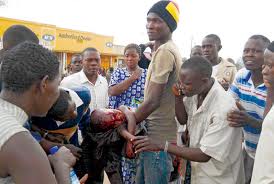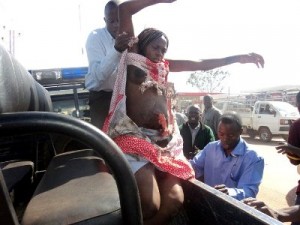Sharpeville-like killings will spark a new armed struggle
By Sam Akaki
25th April 2011: Every Ugandan, whether they support General Museveni’s Apartheid-like regime or oppose it, should be very worried about what will come to Uganda next. The donor countries, which only invoke human rights and intervene when their commercial and geo-political interests are threatened, should be worried too. Why?
Baby Nalwanga’s murder makes Apartheid look saintly
The tragedy of the innocent two-year-old baby Juliana Nalwanga [affectionately referred to as “Gift”] who was shot and killed by the Ugandan in-security personnel in Masaka on 21st April 2001 has become the immortal proof that the former Apartheid regime in South was not the most brutal and heartless regime after all.
Unlike the former Apartheid leaders in South Africa who never targeted children, baby Juliana Nalwanga’s cold blooded murder is incontrovertible proof, if ever it were needed, that General Museveni can and will do anything to stay in power.
Besigye & Mao are Uganda’s Robben Island inmates
Norbert Mao is no longer, and will never again be a political virgin in Ugandan terms following his violent arrest by the police and army personnel who also murdered his supporters in cold blood in Gulu.
By refusing bail and preferring imprisonment, Mao has now joined the prison-hardened Dr Kizza Besigye who has publicly and repeatedly said that he is willing and ready to die in the struggle for freedom in Uganda.
The two national party leaders and presidential candidates, as well as their senior officials, have become the first inmates of Uganda’s Robben Island, which is what the previously unknown and previously heard-of Nakasongola concentration camp has become.
When Sharpeville-like massacre came to Uganda
Almost as an implied admission of guilt, the NRM’s political pamphlet, which is The New Vision, has reported [See: Govt to pay walk-to-work victims’ bills, The New Vision 22nd April 2011] that “…the government will meet the medical bills of Brenda Nalweeyo”; the seven-month pregnant woman and 20-year-old Gerald Kato who were both shot during the walk-to-work demonstrations.
How Sharpeville massacre triggered armed struggle
The indiscriminate shooting and killing of several unarmed demonstrators, children, and pregnant women by Museveni’s police and army on their way to antenatal clinics bares a cunning resemblance to the Sharpeville Massacre which marked the beginning of the armed struggle that finally brought the Apartheid regime in South Africa to an end in 1994.
It will be recalled that on 21st March 1960, in Sharpeville Township-South Africa, 69 unarmed black Africans were indiscriminately shot and killed. Over 300 others were seriously wounded when the Apartheid’s dreaded Bureau of State Security (BOSS) opened fire on demonstrators who were protesting against the “pass laws”.
The Sharpeville Massacre, as the event has become known, led directly to the birth of the Umkhonto we Sizwe [MK] or “Spear of the Nation”, the ANC’s armed wing which was launched to respond to the Apartheid regimes unquenchable thirst for violence with violence.
Justification for an anti-oppression armed struggle
At his treason trial, Nelson Mandela told court that, “…I admit immediately that I was one of the persons who helped to form Umkhonto we Sizwe. I, and the others who started the organisation, felt that without violence there would be no way open to the African people to succeed in their struggle against the principle of white supremacy. All lawful modes of expressing opposition to this principle had been closed by legislation, and we were placed in a position in which we had either to accept a permanent state of inferiority, or to defy the government. We chose to defy the law”.
Mandela continued: “…We first broke the law in a way which avoided any recourse to violence; when this form was legislated against, and the government resorted to a show of force to crush [any] opposition to its policies, only then did we decide to answer violence with violence”.
In a concluding remark that will resonate with Norbert Mao, Dr Kizza Besigye, and millions of pro-democracy activists in Uganda, Mr Mandela told the trial judge that, “…Africans want a just share in the whole of South Africa; they want security and a stake in society. Above all, we want equal political rights, because without them our disabilities will be permanent”.
With Museveni’s police and army shooting anyone who tries to demonstrate anywhere in Uganda; thus closing the last constitutional avenue for Ugandans to express themselves peacefully, the scene is set for a violent Umkhonto we Sizwe-like confrontation with the Apartheid-like government in Uganda.
These are not my words. Mr Adam Wood, the then British High Commissioner, no less, had warned that: “…There is a risk if you don’t allow change. There might be change through violence. I am conscious of what lies in the past”. [See. “British Envoy Advises Parties”, The New Vision, 16th January 2003]. Museveni and Museveni alone will have to bear the consequences of the violence that is now inevitable. END. Please login to www.ugandacorrespondent.com every Monday to read our top stories and anytime mid-week for our news updates.
![]()



